Post
A catch
Save a catch to start your fishing logbook. You will be able to to share it with the community if yo want!
A fishing trip
Post an ad to go fishing with other fishermen
Save a catch to start your fishing logbook. You will be able to to share it with the community if yo want!
Post an ad to go fishing with other fishermen
Share a thought, a question with the community
My favorite cities
×Join our 14 fishermen in Carnegie in Allegheny. The fishing forecast is currently 3.9. The most caught fishes here are the white bass, the american eel, the colorado pikeminnow and the largemouth bass. Come try the most famous fishing techniques like the angling - using floats, how to catch smelt with square net?, surfcasting or angling - using natural bait.
Our fishing forecast of Carnegie indicates the best time to go fishing in this city.
The White Bass
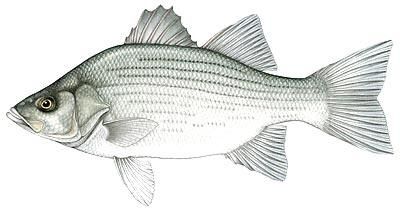
The White Bass belongs to the Moronidae family. Its maximum length is 46 cm and its maximum weight is 3.2 kg. Its maximum lifespan is 15 years. Spawning takes place from March to May. The best time to catch it is from mid-April to mid-May. As with other true basses, the dorsal fin is clearly double, separated into thorny and soft-raked parts. White Bass is a silvery shade ranging from dark grey or black on the back to white on the belly. Several incomplete lines or stripes extend horizontally on either side of the body. Adults look like a young striped bass, and the two are often confused. However, the striped bass has two distinct pieces of teeth on the back of the tongue, and the white wolf has one piece of tooth. The striped bass has two points on each cap, unlike the white bass which has one, and the second spine of the anal fin measures about half of the third spine of the striped bass, while it is about two thirds the length of the third spine in White Bass.
The White Bass is a famous fish you can catch in Carnegie.The American Eel
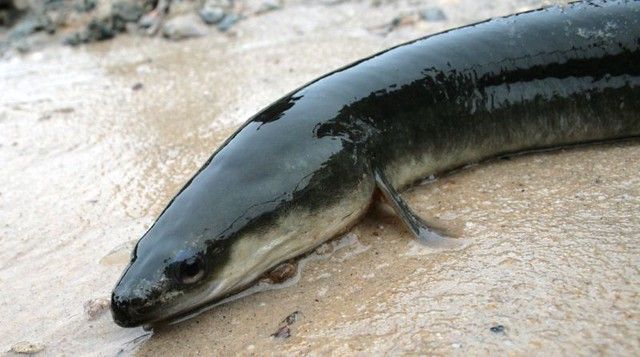
The American Eel belongs to the Anguillidae family. The size of the adult female can reach 1 m in length, while that of the male does not exceed 40 cm. Spawning takes place in mid-winter. Females lay 3 to 22 million eggs. He can live to be 50 years old. It can be fished from April to September. The American eel is a species of fish with a snake-like body all in length with fins that extend over its back, around its tail and along its inner surface. It has thick lips and a slightly longer lower jaw than her upper jaw, which gives her the appearance of having an overbite. The color of young eels varies from yellow-green or brown. Adult eels are grey with white or cream bellies.
The American Eel is a famous fish you can catch in Carnegie.The Colorado pikeminnow
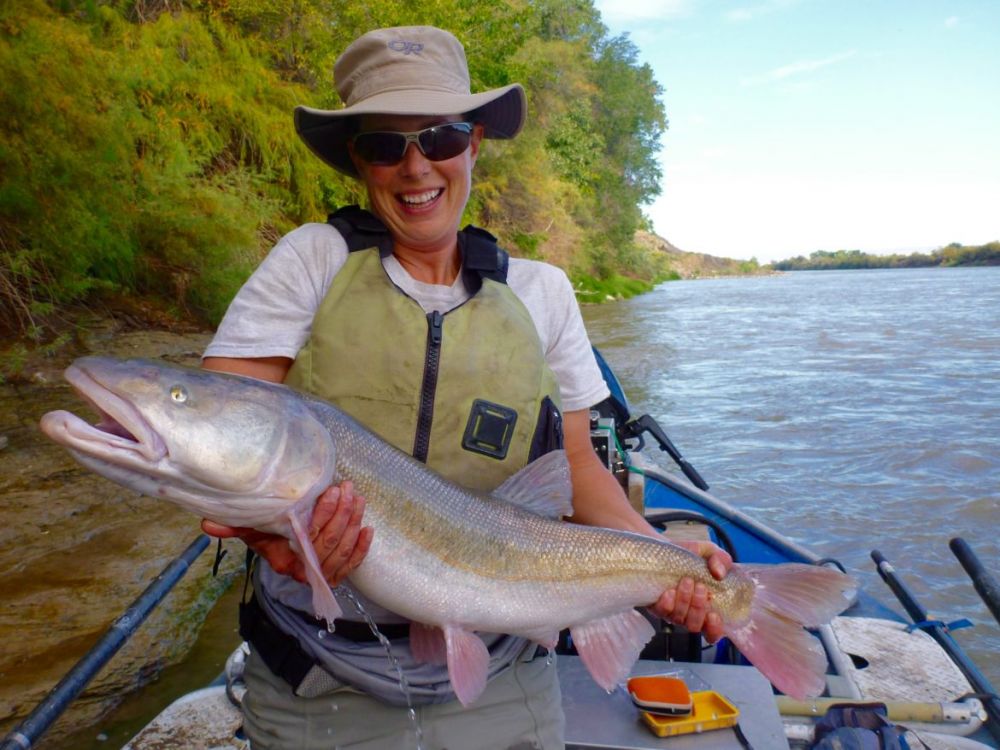
The Colorado Pikeminnow belongs to the Cyprinidae family. The average length of the Colorado pikeminnow is 52.5 cm. The longest Colorado pikeminnow reported is 180 cm. The maximum age recorded for Colorado pikeminnow is 12 years. They spawn from late spring to mid-summer. Fishing is extremely restricted and prohibited because the Colorado Pikeminnow is an endangered species. Like the other three species of pikeminnows, its extended body resembles that of pike. The cone-shaped, slightly flattened head is elongated and forms nearly a quarter of the length of the body. Color levels range from bright olive green on the back to a lighter yellowish shade on the sides, through white. Young fish have a dark mark on the caudal fin. The dorsal and anal fins generally have 9 rays. Pharyngeal teeth are long and hooked.
The Colorado pikeminnow is a famous fish you can catch in Carnegie.The Largemouth Bass
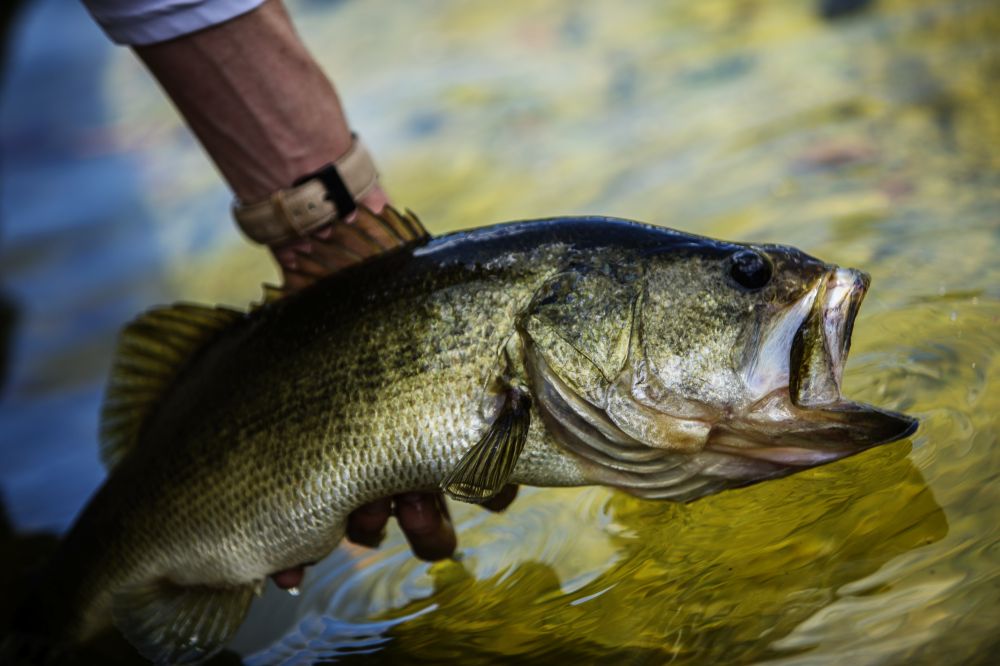
The Largemouth Bass belongs to the Centrarchidae family. It has an average size of 45 cm but may reach 60 cm. The maximum recorded weight was 10,09 kg. It has a lifespan of 6 years. It breeds between February and July. It can be fished all year round. Largemouth bass has a large mouth with a slightly oblique mouth. Its body is thin to robust, slightly flattened laterally and of oval cross-section. The corner of the mouth extends beyond the eye. The back and head are dark green to light green in color with lighter sides and a whitish belly and underside. A large lateral band can be seen from the snout through the eyes to the base of the tail. Towards the tail, there is a series of spots of different sizes. These spots become a solid and uniform band on the caudal peduncle. The eye is golden brown. Vertical fins slightly pigmented, generally clear paired fins; caudal fin in young and adult. Adults in muddy lakes are dark olive brown to black, with marks that are difficult to distinguish. Males in breeding condition tend to be darker in color.
The Largemouth Bass is a famous fish you can catch in Carnegie.The Pallid Sturgeon
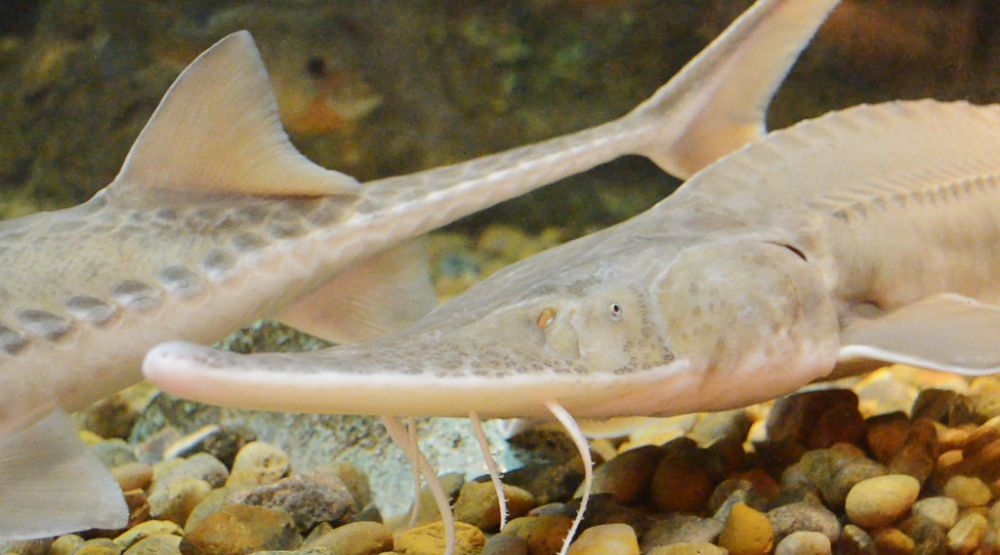
The Pallid Sturgeon belongs to the Acipenseridae family. it measures between 70 and 150 cm long and 39 kg in adulthood. The Pallid Sturgeon takes 15 years to reach maturity, and can live for more than a century. it breeds from May to July. Considered as endangered, it cannot be caught. Like the other Acipenseridae, it is considered as a "living fossil". The Pallid Sturgeon has a characteristic appearance that makes it to be qualified as "primitive" or "dinosaur". It has a pale color, especially in adults who fade with time, with a greyish back and sides. Its caudal fin is heterocercal, with an upper lobe more developed than the lower lobe. Like other sturgeons, the Pallid Sturgeon has no calcified scales or bones, unlike more recent fish species. It has a cartilaginous skeleton with five rows of thick patches that extend along its sides, belly, back and most of its head. These plates are covered by the skin and protect the animal. This cartilage also extends to the back of the fish’s body, between the dorsal fin and the tail. The mouth starts well set back from the tip of the head. Because it has no teeth, it uses this stretchy mouth to suck small fish, shellfish and other foods from the bottom of the river. Like all sturgeons, it has four barbells. We think they have a sensory role in detecting food.
The Pallid Sturgeon is a famous fish you can catch in Carnegie.Our fishing forecast of Carnegie indicates the best time to go fishing in this city.
Our fishing forecast of Carnegie indicates the best time to go fishing in this city.
Our fishing forecast of Carnegie indicates the best time to go fishing in this city.
